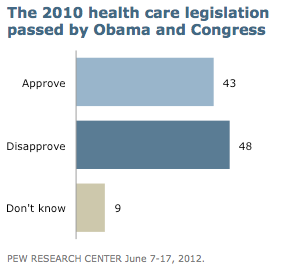
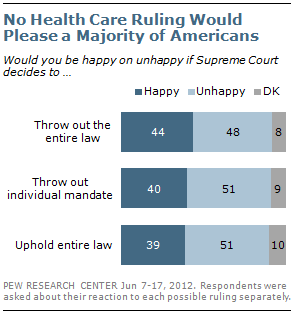

The American public has been deeply divided from the start over the health care reform law now before the U.S. Supreme Court, though opinion has generally tilted more negative than positive over the past two years. A majority of Americans disapprove of a key component of the law, which requires most individuals to be covered by health insurance by 2014 or pay a penalty. (See more below.)
According to a Pew Research Center survey conducted in mid-June – in advance of the court’s ruling – 48% of the public disapprove of the 2010 Affordable Care Act, while 43% approve. That’s little different from April 2010 – shortly after the law was enacted – when 44% said they disapproved and 40% said they approved.
The June survey also shows the public is unlikely to be satisfied with the Supreme Court’s ruling – no matter what the court decides. Whether the Court decides to uphold the entire law, overturn the entire law, or reject the “individual mandate” while allowing the rest of the law to remain in place, fewer than half of Americans say they would be happy with the decision.
The public’s expected reactions track along partisan lines. Most Democrats would be happy if the law is upheld, while most Republicans would be happy if it is thrown out. The other widely discussed possibility – that the court could reject the individual mandate while keeping the rest – does not satisfy either side.
A More Wary Public
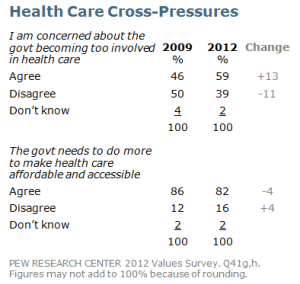
An earlier Pew Research Center survey finds that the public has become more wary of the government’s role in health care since the early days of the debate over the legislation in 2009. About six-in-ten (59%) now say they are concerned that the government is becoming too involved in health care, according to the Pew Research Center’s 2012 American Values Survey, released in June. That’s up 13 points since 2009. Still, about eight-in-ten (82%) agree that the government needs to do more to make health care affordable and accessible.
A Deepening Partisan Divide
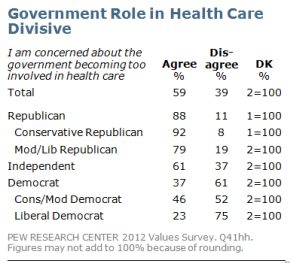
The partisan divide over the government role in health care, already large in 2009, has only grown larger. Today, 88% of Republicans express concern about the government becoming too involved in health care; 37% of Democrats agree. This 51-point gap is the single largest partisan divide of the 79 items included in the values survey.
The divide over health care fits a broader pattern of growing partisan disagreement over the role and effectiveness of government. For example, the values study shows that Republicans have become much less supportive over the past 25 years of the notion that government should help those in need, while Democratic attitudes are little changed. (See full slideshow of findings.)
Individual Mandate Unpopular
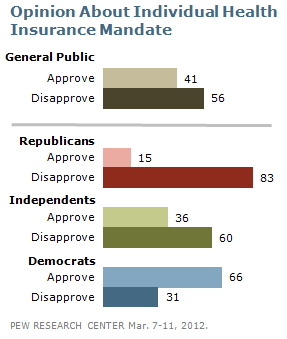
A clear majority of those surveyed in a March Pew Research survey disapprove (56%) of the provision in the 2010 Affordable Care Act that requires most individuals to have health insurance by 2014 or pay a penalty. About four-in-ten (41%) approve of the mandate. The constitutionality of the requirement is a key component of the Supreme Court case expected to be decided by the end of June.
The partisan divides remain stark over the health care law in general. In the April survey, 87% of Republicans say they disapprove and 9% approve of the law. Among Democrats, 74% approve and 17% disapprove. About half of independents (52%) disapprove, while 36% approve. And the disparity is nearly as large in responses to questions about the health care mandate. About eight-in-ten Republicans (83%) disapprove of the mandate, while two-thirds of Democrats (66%) approve of it. A majority of independents opposes the mandate (60% vs. 36%).
A March compilation of survey data by the Pew Research Center and other polling organizations – “Public Remains Split on Health Care Bill, Opposed to Mandate” — shows similar results on a range of questions dealing with support for the health care law and the individual mandate.
Public Opinion About the Supreme Court
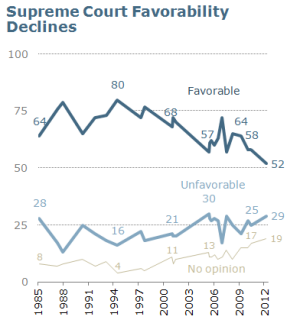
While most Americans say the Supreme Court’s March hearings on the health care law did not change their views of the law or of the Court, the hearings did more harm than good to the image of both.
In a survey done with the Washington Post in April 2012, nearly two-thirds (63%) say that what they saw and heard about the hearings did not change their opinion of the health care law. Another 23% say they now have a less favorable opinion and just 7% a more favorable opinion of it.
Similarly, 65% say their view of the Supreme Court remained unchanged after the hearings, but the number who say their view of the Court has grown more negative is three times the number who say it has grown more positive (21% vs. 7%).
The Pew Research Center survey conducted in April shows declining favorability for the Supreme Court more generally; 52% say they have a favorable opinion of the nation’s top court, down from 58% in 2010 and the previous low of 57% in 2005 and 2007. About three-in-ten (29%) say they have an unfavorable view, which approaches the high reached in 2005 (30%).
Conducted after the health care hearings, the survey finds that the law’s supporters and opponents express similar views of the court.
Health Care: A Top Issue for Voters
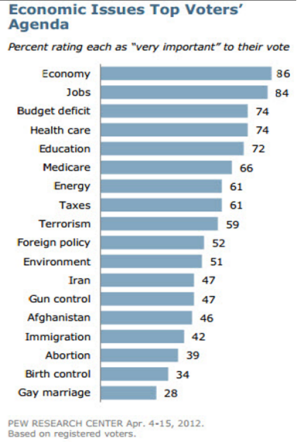
Health care remains a top issue for voters; 74% say the issue will be very important to their vote this fall. Health care ranks in the top tier of issues included in a Pew Research Center April survey, just below the economy (86%) and jobs (84%) and matching the budget deficit (74%).
Though there are wide partisan differences on some of the issues, the divide is relatively modest on health care; 84% of Democrats say this issue will be very important to their vote, compared with 74% of Republicans and 66% of independents.





